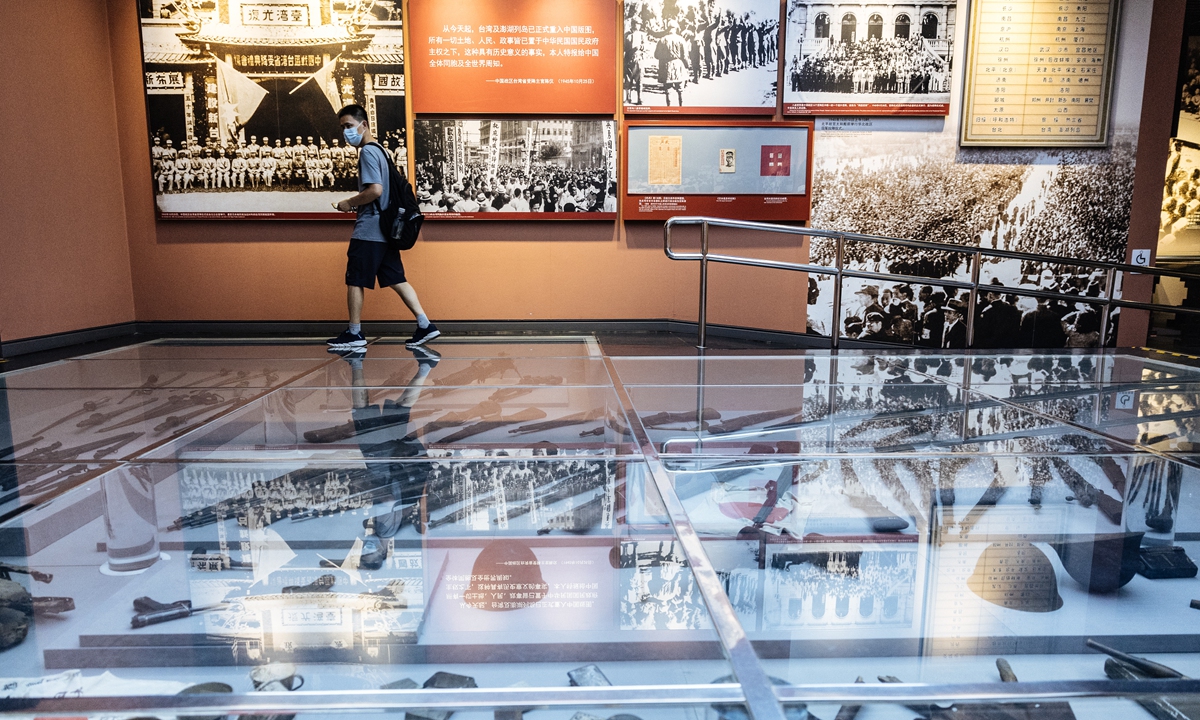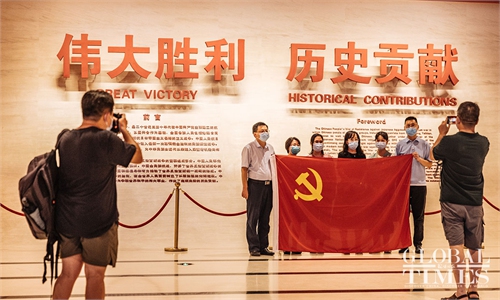‘We dare not forget’: Chinese commemorate 85th anniversary of the July 7 Incident
Warning of revival of militarism in Japan amid growing right-wing instigation

A student looks at historical relics on display at the Museum of the War of Chinese People's Resistance Against Japanese Aggression in Beijing on July 7, 2022, the 85th anniversary of the July 7 Incident in 1937, which marked the beginning of the all-out War of Resistance against Japanese Aggression (1931-45). Photo: Li Hao/Global Times
From leaving flowers to reciting poems at memorial halls for the deceased, Chinese people are paying tribute in various forms to late national heroes on Thursday on the occasion of the 85th anniversary of the July 7 Incident in 1937, which marked the beginning of the all-out War of Resistance against Japanese Aggression (1931-45).
A memorial ceremony was held on Thursday morning at the Museum of the War of Chinese People's Resistance Against Japanese Aggression in Beijing. Senior Communist Party of China (CPC) official Wang Huning delivered a speech at the event.
"Some 85 years ago, Japanese invaders bombarded the city of Wanping [today's Beijing] to achieve their criminal ambition of annexing all of China by force, and carried out the Lugou Bridge Incident which shocked the world. The Chinese people rose up to resist, and became the main battlefield in the east in the world's anti-fascist war," Wang, a member of the Standing Committee of the Political Bureau of the CPC Central Committee and a member of the Secretariat of the CPC Central Committee, said.
"All Chinese people fought to protect their motherland from tragedy in blood and tears, showing the majestic and indomitable spirit of the Chinese nation," Wang noted.
The top trending topic on Sina Weibo said "We dare not forget what happened this same day 85 years ago." The topic was viewed 730 million times and discussed 3.5 million times as of press time.
As Global Times reporters visited the museum at around 1 pm on Thursday as outside temperatures surpassed 35 C, they saw groups of people already queuing up outside, waiting for the 1:30 pm reopening of the museum which had been closed to visitors since May 3 due to the COVID-19 epidemic.
Luo Cunkang, curator of the museum, told the Global Times on Thursday that there are more than 60 memorial halls across China celebrating the anniversary. "One cannot learn from history without fully understanding it, and one can only learn the value of peace better when reviewing wartime history, especially under the current complicated international landscape."
"I wish young people will know more about history and learn our martyrs' spirits so they make greater contributions in building our country into a stronger one and making efforts to maintain world peace," Luo said.
While Luo explained the stories behind each picture and artifact, an 8-year-old child surnamed Gao was seen listening intently to the curator, sticking his head almost into the pictures on the wall. Gao told the Global Times that he came with his father to the museum for the first time on such a special occasion.
Although this part of the history is not taught until the third or fourth grade, Gao already learned from the story of his great-grandfather, who was killed in the war. Gao was shocked to see the exhibits. "Look at the shot holes on the soldier's steel helmet! You can imagine how brave he was," Gao told the Global Times.
At the Memorial Hall of the Victims in Nanjing Massacre by Japanese Invaders, an educational activity was held to commemorate the anniversary. A group of primary school students from Nanjing, East China's Jiangsu Province, recited a poem titled "Monument of the Nation," which reads, "I listened quietly to the sound of a nation clenching its fist; it was a war that chilled the Japanese to the bone. The last bullet erupted with fury, into the chest of the enemy."
At such an occasion to reflect on a nation's history, experts noted that today's Japan has not learned from its past but instead, grows even more aggressive in trying to expand its military presence using security threats as pretexts. They warn of a growing right-wing force among the Japanese government, in which people see its military past reviving from 85 years ago.
Chinese Foreign Ministry spokesperson Zhao Lijian on Thursday urged Japan to effectively face up to its history of aggression, learn a profound lesson and adhere to the path of peaceful development with practical actions.
Tokyo has been keen on hyping the Ukraine crisis and "China threat" to support and advocate expansion of NATO in the Asia-Pacific. By elaborating on the rhetoric, Japan is aiming to revise its postwar pacifist constitution, which could allow it to get rid of the constraint of the supreme charter, participate in NATO, and seek to develop into a military power, experts said.
"The logic behind a growing right-wing voice in Japanese society is that Japan's ruling party is exaggerating so-called security threats to create tensions among the masses, encourage conservative thinking, and fanning hostility toward neighboring countries so they can achieve their ambitions," Da Zhigang, director of the Institute of Northeast Asian Studies at Heilongjiang Provincial Academy of Social Sciences, told the Global Times on Thursday.
Such an atmosphere comes from a sense of anxiety from Japan, due to its declining economic competitiveness and pressure in dealing with its neighbors and relations with major world powers, Da said.

